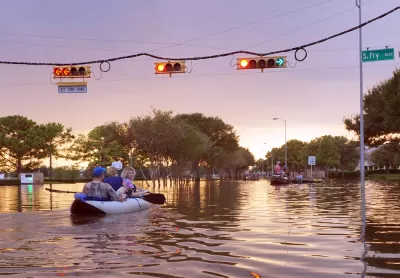The economic case for investments in resilience just got a lot stronger.

Kim Slowey shares news of a report from the National Institute of Building Sciences (NIBS) that accounts for the benefits of investing in resilience.
According to Slowey's explanation of the study's finings, "every federal grant dollar spent on disaster resiliency and mitigation can save the U.S. an average of six dollars." Moreover, "every dollar spent on building to a higher standard than select building codes require could save the nation four dollars." Another key finding of the report touts the benefits of resilience investments to long-term jobs and demand for American-made construction materials.
The study examined standards for wind, water, earthquake, and fire resistance—covering multiple angles from which the natural environment can assault the built environment. Attention to matters of resilience is clearly reflected in new building standards. For instance, in November, the U.S. Green Building Council released a new resilient construction standard called RELi.
FULL STORY: Report: Resilient design saves an average of $6 for every $1 spent

Planetizen Federal Action Tracker
A weekly monitor of how Trump’s orders and actions are impacting planners and planning in America.

Vehicle-related Deaths Drop 29% in Richmond, VA
The seventh year of the city's Vision Zero strategy also cut the number of people killed in alcohol-related crashes by half.

As Trump Phases Out FEMA, Is It Time to Flee the Floodplains?
With less federal funding available for disaster relief efforts, the need to relocate at-risk communities is more urgent than ever.

Improving Indoor Air Quality, One Block at a Time
A movement to switch to electric appliances at the neighborhood scale is taking off in California.

Opinion: How to Rebuild the ‘Starter Home’ Market
Large minimum lot sizes and restrictions on multi-unit housing put an artificial floor under home costs. Is it time to eliminate them?

How Understanding Near-Misses Can Improve Road Safety
Most road safety efforts are based on data about crashes that have already occurred. But important information can be gleaned from incidents when something almost went wrong, but didn’t.
Urban Design for Planners 1: Software Tools
This six-course series explores essential urban design concepts using open source software and equips planners with the tools they need to participate fully in the urban design process.
Planning for Universal Design
Learn the tools for implementing Universal Design in planning regulations.
Borough of Carlisle
Smith Gee Studio
City of Camden Redevelopment Agency
City of Astoria
Transportation Research & Education Center (TREC) at Portland State University
City of Camden Redevelopment Agency
Municipality of Princeton (NJ)





























